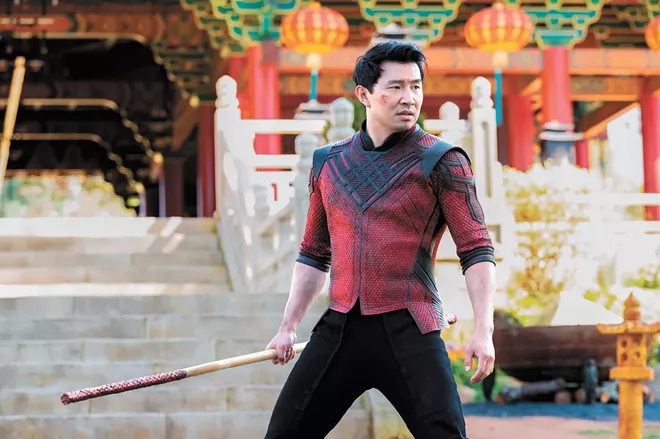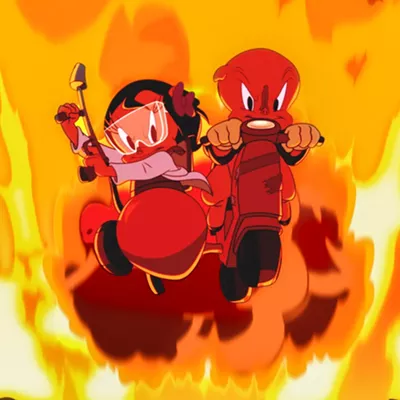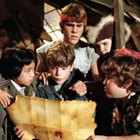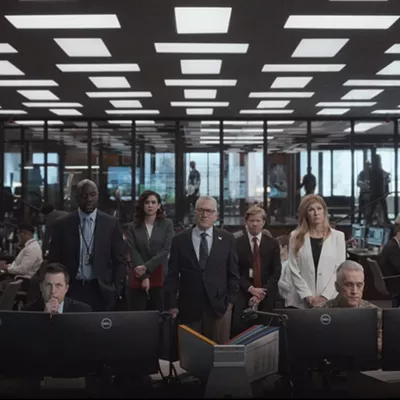The movies of the Marvel Cinematic Universe are like the opposite of Forrest Gump's box of chocolates: You always know what you're going to get. Like a box of chocolates, that can be comforting, but it can also become stultifying, especially when every MCU movie touted as a departure is just a slight variation on the same style, tone and themes. There are plenty of appealing new elements in Shang-Chi and the Legend of the Ten Rings, but it's still an MCU movie, for better and worse.
Played by Simu Liu, the title character — the son of a powerful, nearly immortal crime lord — has rejected his family legacy and is living under an assumed name as a parking valet in San Francisco. But Marvel heroes can never escape their legacies, and so Shang-Chi only gets a couple of scenes to banter with his best friend and potential love interest Katy (Awkwafina) before his father's henchmen come for him, seeking an important jewel that he wears around his neck. It was a gift from his late mother, who was also a nearly immortal warrior, although she sacrificed her immortality to raise Shang-Chi and his sister Xialing (Meng'er Zhang).
There's a lot of complex mythology in Shang-Chi and the Legend of the Ten Rings, and that's before the movie even gets to the requisite Marvel continuity gobbledygook. The movie begins with a lengthy prologue establishing Shang-Chi's father, Wenwu (Tony Leung), and his centuries-spanning empire (powered by those mystical 10 rings), as well as his connection with Shang-Chi's mother, Jiang Li (Fala Chen), and her place in the ancient realm of Ta Lo.
Director and co-writer Destin Daniel Cretton (Short Term 12, Just Mercy) draws on Chinese mythology and the wuxia tradition for Shang-Chi's background, and the first half of the movie establishes its own identity and place within the MCU. Cretton fully commits to making a martial-arts movie, and the fight/courtship scene between Wenwu and Jiang Li recalls the balletic, colorful action of Zhang Yimou's popular wuxia films like Hero and House of Flying Daggers.
There are also dynamic urban fight scenes taking place on an out-of-control bus in San Francisco and in an underground fight club in Macau, where Shang-Chi reunites with Xialing. But as Shang-Chi gets closer to facing off against his dad and returning to his mother's homeland of Ta Lo, the MCU house style takes over. The cameos and supporting roles from established MCU characters mostly serve as distractions, and despite the cast full of accomplished martial-arts performers (including Michelle Yeoh as Shang-Chi's aunt), the climax is a typical MCU flurry of elaborate, weightless CGI.
Liu gets a bit lost as the upstanding but bland Shang-Chi among more charismatic supporting players, including Awkwafina providing her customary scene-stealing comic relief and Hong Kong superstar Leung bringing rare emotional depth and poignancy to an MCU villain. Newcomer Zhang makes for a more complex and intriguing hero as Xialing than her stalwart brother. Like Black Panther, Shang-Chi and the Legend of the Ten Rings uses familial ties to deepen the connection between hero and villain, and to give the final battle greater emotional stakes. MCU heroes always save the world, but they're more interesting when they need to save their own souls, too.
The Marvel machine all but guarantees that Shang-Chi and the Legend of the Ten Rings will be exciting and entertaining, even if it drags on a bit too long and loses some steam in its climax. It marks an important step forward for Asian representation in blockbuster cinema, but the MCU is still right where it's always been. ♦




















